|
Limitar tu búsqueda
[+–] Editorial
[+–] Fecha
[+–] Formato
[+–] Idioma
[+–] Tipo de documento
[+–] Tipo de recurso
[+–] Classification
|

|
|
Are loan guarantees effective? The case of mexican government banks
Mexican Government’s Banks offer loan guarantees to private banks in order to spur credit directed to non-financial small and medium sized firms and this policy is examined here. Application of representative data to the comparative static analysis of the guarantee-use decision suggests that these schemes, as currently designed, are justifiable from an economic viewpoint. However, there is some...
|
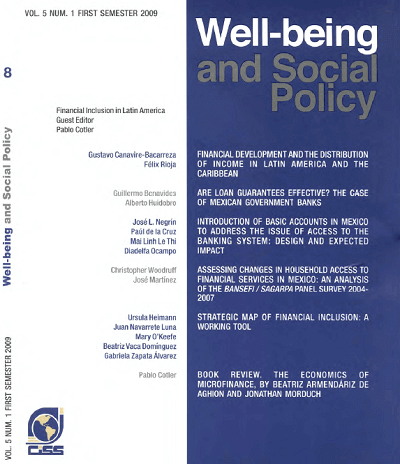
|
|
|
|

|
|
Natural disasters and poverty in Latin America: welfare impacts and social protection solutions
The Inter-American Conference on Social Security (CISS) and the United Nations Development Programme (UNDP) Office in Mexico jointly organized the conference “Natural Disasters in Latin America: Welfare Impacts and Social Protection Solutions” held in Mexico City in January 2010. The main objectives of the conference were to improve the understanding of (i) how natural disasters affect...
|
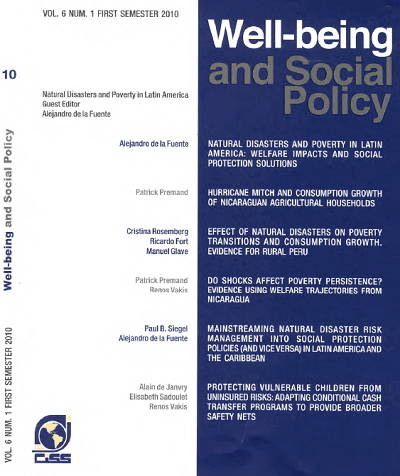
|
|
|
|

|
|
Book review. Informe de evaluación de la política de desarrollo social en México 2008, CONEVAL
The Evaluation Report on Social Development Policy in Mexico was published by the National Council for Social Development Policy Evaluation (CONEVAL) in 2008. The Council is one of the constituting elements of the new institutional framework to evaluate the public sector performance, particularly social development policies that were put in place mostly during the first decade of this century....
|
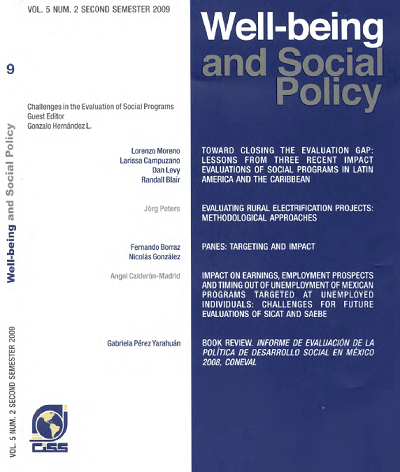
|
|
|
|

|
|
Impact on earning, employment prospects and timing out of unemployment of mexican programs targeted at unemployed individuals: challenges
his paper presents estimates of the impact of programs for unemployed workers on the performance of program beneficiaries in Mexico. We emphasize the significance of applying methodologies capable of avoiding statistical bias attributable to unobserved variables when measuring the impact on earnings and allowing to us properly estimate unemployment duration and work status after exiting from...
|
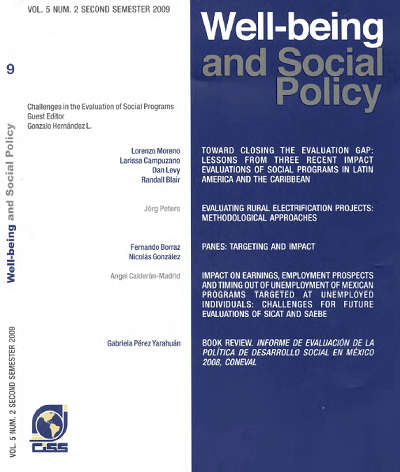
|
|
|
|

|
|
Toward closing the evaluation gap: lessons from three recent impact evaluations of social programs in Latin America and the Caribbean
Despite recent growing demand from funders and governments, rigorous impact evaluations in Latin America and the Caribbean remain the exception rather than the rule. Many commissioned impact evaluations are methodologically weak, and thus only marginally useful in assessing the impact of social interventions. Other impact evaluations feature strong research methodologies at their conception, but...
|
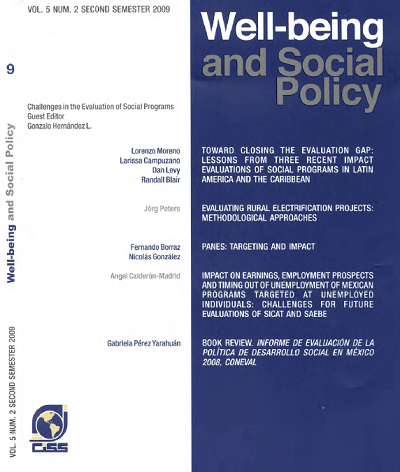
|
|
|
|

|
|
Strategic map of financial inclusion: a working tool
Various circumstances make difficult the rigorous study of processes, strategies and impact of V the efforts of financial inclusion and penetration, either at the academie level, in the public policy area or in companies and organizations of financial services industry. The central problem in Mexico has been the lack of a unified agreement on the definition and the low comprehension level of the...
|
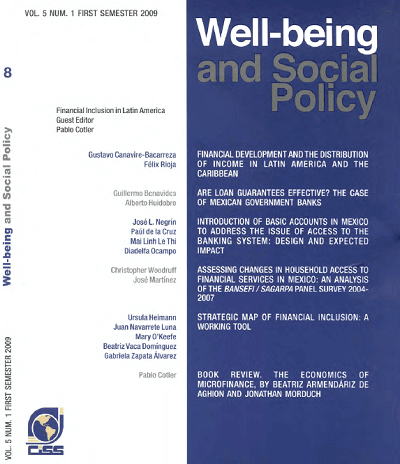
|
|
|
|

|
|
Assessing changes in household access to financial services in Mexico: an analysis of the BANSEFI/SAGARPA panel survey 2004-2007
In March 2004, BANSEFI and SAGARPA began a project to examine the impact on households I of the Program to Strengthen the Popular Credit and Savings Sector (Programa de Fortalecimiento del Sector de Ahorro y Crédito Popular), which was designed to help non-bank financial intermediaries to abide by the Ley de Ahorro y Crédito Popular (LACP), passed by the Mexican Congress in 2001. During the...
|
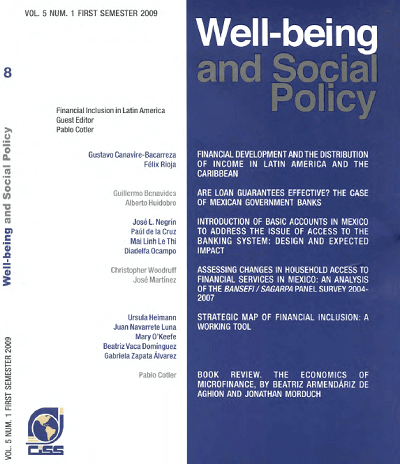
|
|
|
|

|
|
Introduction of basic accounts in Mexico to address the issue of access to the banking system: design and expected impact
This article presents the Mexican experience with the introduction of basic transaction accounts. Basic accounts are relatively cheap simple banking products with restricted functionality targeted at social groups that have limited access to transaction accounts. In Mexico, basic payroll accounts and accounts for the general public were introduced. By law, these products must be offered by all...
|
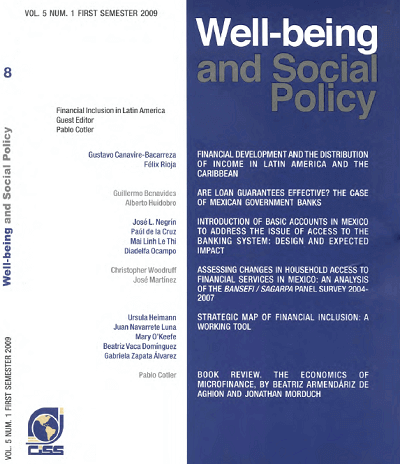
|
|
|
|

|
|
Book review. Public policy for an inclusive growth, edited by Pablo Cotler
The book “Public Policy for an Inclusive Growth” (The book) is an opportune and fortunate document. It is opportune because it is presented at a time in which public policy topics are subject to a wide debate in Mexico, and the discussion is fed with diverse points of view, theoretical and political, from which it is the purpose to analyze, design, redesign, implement, and evaluate the government...
|
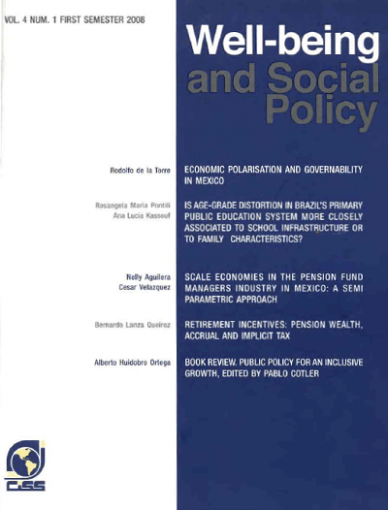
|
|
|
|

|
|
The time pattern of remittances: evidence from mexican migrants
We explore the time pattern of remittances using data on return migrants from the Mexican Migration Project. Some of these return migrants have settled in the U.S. and are returning to Mexico to visit family and friends, whereas others are temporary migrants returning home after a working spell in the U.S. We find that the dollar amount remitted first increases with time spent in the U.S. to...
|
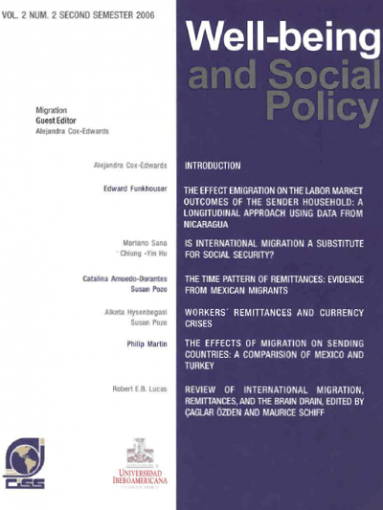
|
|
|
|

|
|
Scale economies in the pension fund managers industry in Mexico: a semi parametric approach
It has been widely accepted that reforms on pension schemes have led to improvements in the financial viability of the systems. Nevertheless, at the same time it has been shown that fees charged by pension fund managers (PFM) are very high, implying high mark-ups for them and lower expected pensions for the participants. The presence of economies of scale has been suggested as one main reason for...
|
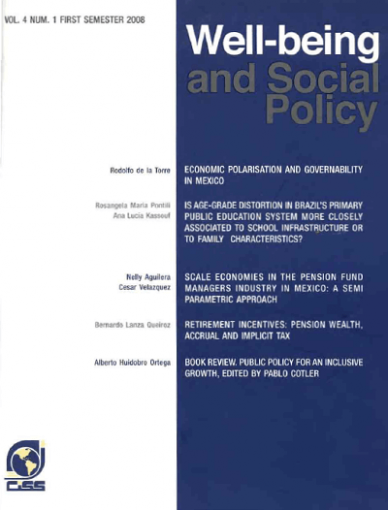
|
|
|
|

|
|
Economic polarisation and gobernality in México
The purpose of this essay is to appraise alternative hypothesis about the origins of recent social revolt in Mexico. It shows that it is not clear that a severe rise in poverty preceded the origins of violent conflict but social polarisation. Therefore, government attempts to deactivate the economic factors that led to social unrest did not necessarily upgrade povertyreduction policies. The...
|
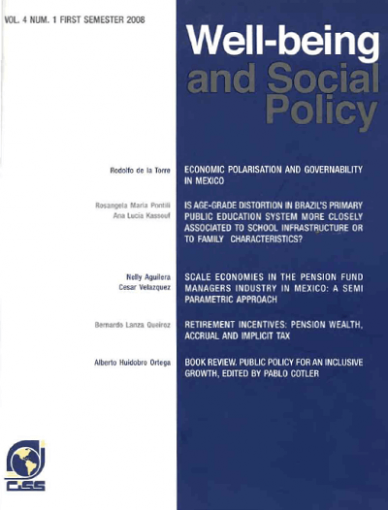
|
|
|
|

|
|
Conflict and power: the teachers' union and education quality in Mexico
The teachers union in Mexico, or Sindicato Nacional de Trabajadores de la Educación (SNTE) represents over 1 million members and is the largest in Latin America. This study uses data from the national student tests administered by the Instituto Nacional para la Evaluación de la Educación (INEE), along with data from the Mexican Ministry of Education and other sources, to investigate the...
|
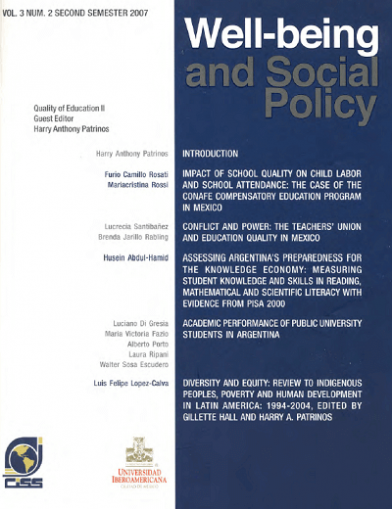
|
|
|
|

|
|
Impact of school quality on child labor and school attendance: the case of the CONAFE compensatory education program in Mexico
This paper focuses on the impact that two different types of policy interventions, namely enhancing school quality and contingent cash transfers, have on child labor and school attendance in Mexico. While there are many studies on the impact of Oportunidades on schooling outcomes, little evidence is available on whether school quality programs such as CONAFE also reduce child labor and help keep...
|
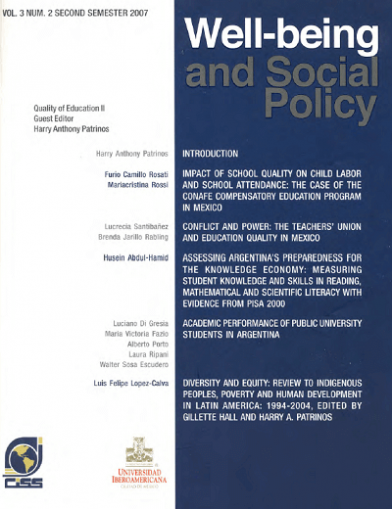
|
|
|
|

|
|
Book review. Improving the quality of education in Mexico: Positions and proposals, edited by Francisco Miranda, Harry Patrinos y Ángel López
This book gathers analyses performed by several authors on policies considered appropriate by the World Bank to enhance the quality of basic education provided in Mexico, in particular, education received by majority sectors in our society (World Bank: 2005).
|
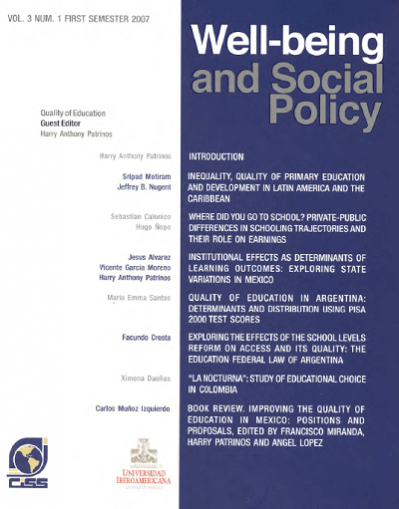
|
|
|
|

|
|
Institutional effects as determinants of leaning outcomes: exploring state variations in Mexico
We use the PISA 2003 student-level achievement database for Mexico to estimate state education production functions. Student characteristics, family background, home inputs, resources and institutions are controlled for. We take advantage of the state-level variation and representative sample to analyze the impact of institutional factors such as state accountability systems and the role of...
|
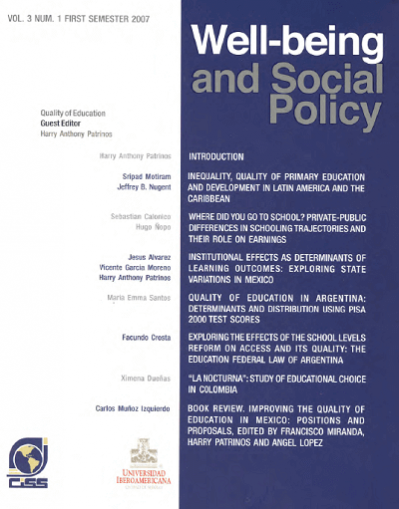
|
|
|
|

|
|
Workers' remittances and currency crises
We seek to further understand the factors that determine per emigrant remittances using data from 23 Latin American and Caribbean countries over the 1980-2003 period. We find that emigrants avoid remitting when the exchange rate is under pressure. This finding is consistent with the notion that remitters strive to reduce their exposure to exchange rate losses by taking into account the expected...
|
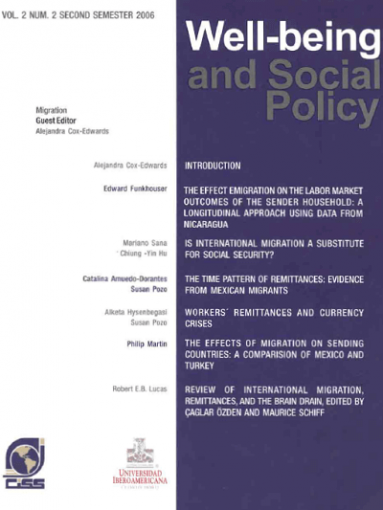
|
|
|
|

|
|
Conferencia Interamericana de Seguridad Social
Folleto conmemorativo de los 75 años de la Conferencia Interamericana de Seguridad Social en el que se presenta una semblanza del organismo, su estructura y su membresía.
|

|
|
|
|
|